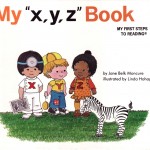 Even though this is coming almost at the end of the readiness skills series starting with each letter of the alphabet, it is probably the basis for all the rest. Y = yourself, or the child’s sense of self and self-concept.
Even though this is coming almost at the end of the readiness skills series starting with each letter of the alphabet, it is probably the basis for all the rest. Y = yourself, or the child’s sense of self and self-concept.
Before children are about 3 years old, they see themselves in terms of labels and things they do: girl or boy, age, color of hair, eyes, good or bad, swim, jump, etc. As children grow and develop beyond this age, so does their long-term memory and they start to include their memories of things that have happened and their feelings. Children who can cope with frustration and difficulty see themselves as quite capable. Children who are easily frustrated see themselves as less able even though the opposite may actually be the case. The difference may be based on temperament and have nothing to do with ability! This makes sense even for adults. If we try to do something and are easily frustrated and discouraged we think we can’t do it, maybe we’re just dumb. On the other hand, if we have a high tolerance for frustration, we continue on and think we are capable. Of course, there are more factors than this that contribute to the sense of self, but we can boost children’s sense of self-worth by giving them strategies to cope with frustration.
Humor is one strategy. At school, sometimes when kids are having a lot of difficulty with an activity, we practice using words instead of ripping the paper or throwing the lego. We use ones like oh macaroni, oh pizza, oh ice cream with sprinkles and cherries and whipped cream and chocolate sauce and marshmallows, and…ketchup, and…gravy…, and by this time the child has usually started to giggle and we can try again. Sometimes, we practice saying in lots of different voices, “It’s ok to be frustrated, it’s not ok to throw.” I usually start off high and drop my voice and my body lower and lower and ask the child if it’s ok yet, because if I go any lower I’ll have to get on the floor. Stories can also help, such as one many parents might remember, Alexander and the Terrible, Horrible, No Good, Very Bad Day.
For today, help your little one deal with frustration and take it in stride. This is a strategy that we can all practice. Any suggestions for tomorrow’s Z?
